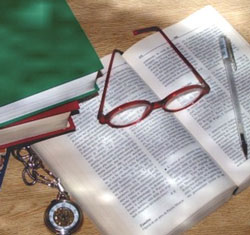Assuming that what you have created is original and a few other requirements are met, copyright will vest automatically in your masterpiece. However, this automatic existence of copyright makes it very appealing, but ownership isn't always an easy maze to navigate.

You have just written a great book, designed a brilliant product, taken a picture that really does say a thousand words... but who owns the copyright? (Image: Wikimedia Commons)
The most important thing to make sure of, before you start to threaten the guy next door for infringing your copyright, is to ask yourself the question "Was the copyright even mine to begin with?"
Perhaps the biggest misconception around copyright is that whoever created the copyright work owns the copyright. While this may be the general rule, creative minds should be warned.
If you have been commissioned to: take a photograph; paint or draw a portrait; make gravure (fancy speak for printing using an etched plate); or make a film or sound recording and someone agrees to pay you money to do so, the copyright will vest in the commissioner of the work, not you.
On the other hand, if you have designed a new copyright work, such as an artistic or literary work, even if it was commissioned, you are probably entitled to claim that you are the owner of the copyright.
Complex
The complexity does not end there. For example, if you have been commissioned to create a label for a third party's product or have created a new logo for a company, and have been paid you to do so, you are probably the owner of the copyright but the client probably has an implied licence to use it. Also, if you make a copyright work in the course of your employment, your employer may well own the copyright.
Given this grey area of the ownership of and right to use copyright, how do you make sure everyone involved knows who owns the copyright?
Copyright is a form of property that can be transferred in various ways, one of which is an assignment. All assignments, to be valid, are required to be in writing and signed by the person assigning the copyright in the work. You can also enter into an agreement to assign the copyright in respect of future works, or existing works where copyright does not yet exist. If ever you are involved in a commercial transaction in which you are required to create a copyright work, or a series of works for that matter, it is advisable to have a document clarifying eventual ownership. This can divide ownership of copyright for use in different applications.
'Moral rights'
For example, if you have been commissioned to create an image of a wheel of cheese by an organisation for its advertising, can you honestly claim that it is your cheese? The organisation will often ask you to enter into an assignment so that the copyright in that work, once it is made, will immediately vest in the organisation. You could agree or, as an alternative, you could try to incorporate a clause in your agreement with the organisation that states that, in respect of the right to include the work in art books, the copyright in that work will vest in you and not the organisation.
Having trouble digesting this? You can rest easy that, irrespective of who owns the copyright, the creator of a work will have protection of what is termed your "moral rights". Essentially, even though you may not own the copyright in a work, if you have created it, you will have a claim to be recognised as the author of it and you will have a right to object to any modification, distortion or mutilation of your work if it would harm your honour or reputation.
In summary, before you commission another to create something for you or before you agree to create something for someone else, take a moment to think about the ownership of the copyright in your creation. After all, the more important your cheese (or copyright) is to you, the more you want to hold on to it.







































